Critical Analysis: Negative Impacts of Brexit on UK Business
VerifiedAdded on 2022/12/05
|6
|1225
|411
Essay
AI Summary
This essay critically evaluates the negative impacts of Brexit on UK businesses. It begins by outlining the formation of the EU and the UK's historical relationship with it, leading to the Brexit decision. The main body then explores the adverse effects of Brexit on UK businesses, including the elimination of free trade, which leads to trade delays, increased costs, and supply chain disruptions. The essay also discusses the restrictions on the free movement of citizens, which negatively affects the workforce pool and poses challenges for businesses in terms of labor supply and compliance. The conclusion summarizes the detrimental effects of Brexit on UK businesses, trade, and employment. The essay draws on various sources to support its arguments, providing a comprehensive analysis of the economic and business consequences of Brexit.
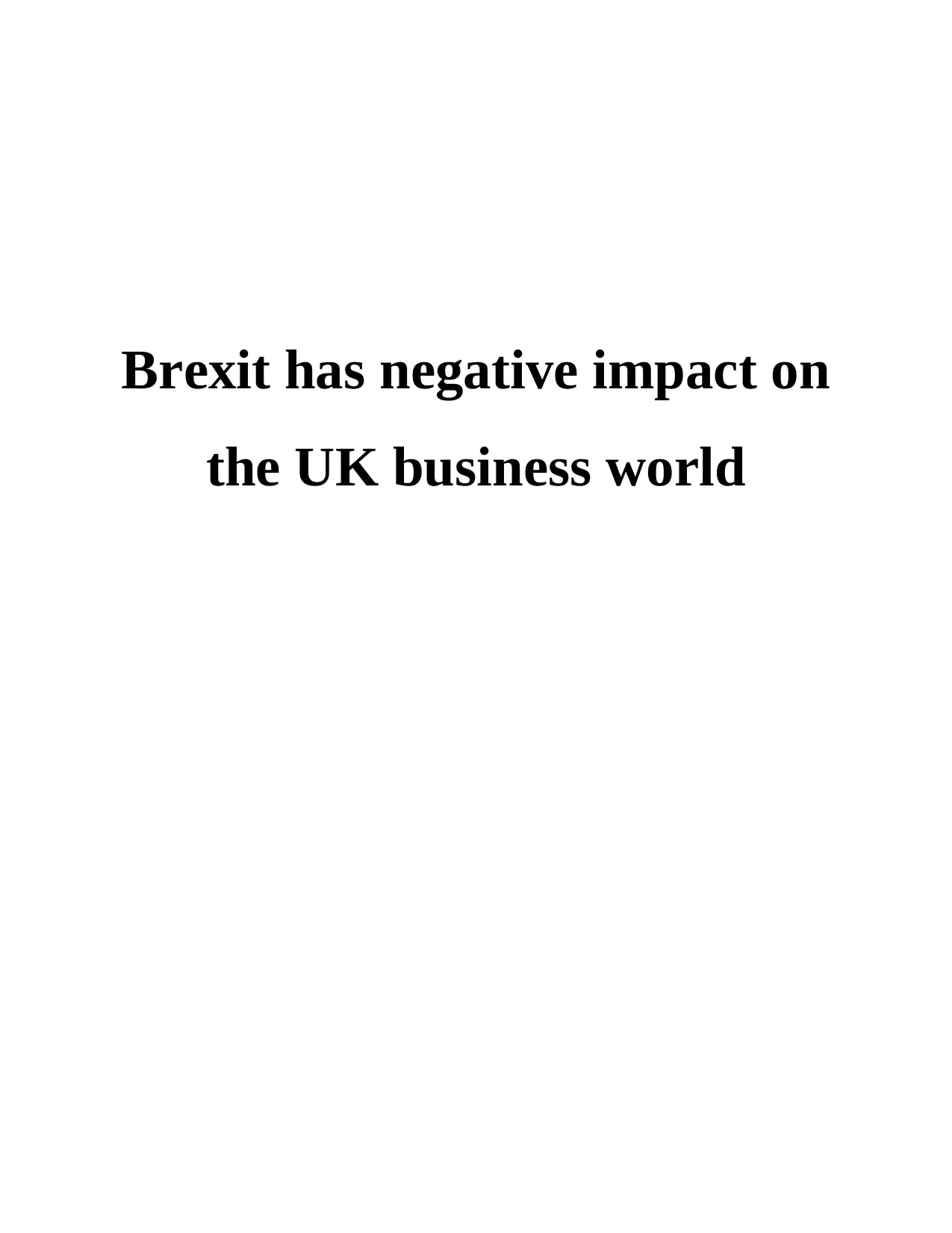
Brexit has negative impact on
the UK business world
the UK business world
Paraphrase This Document
Need a fresh take? Get an instant paraphrase of this document with our AI Paraphraser
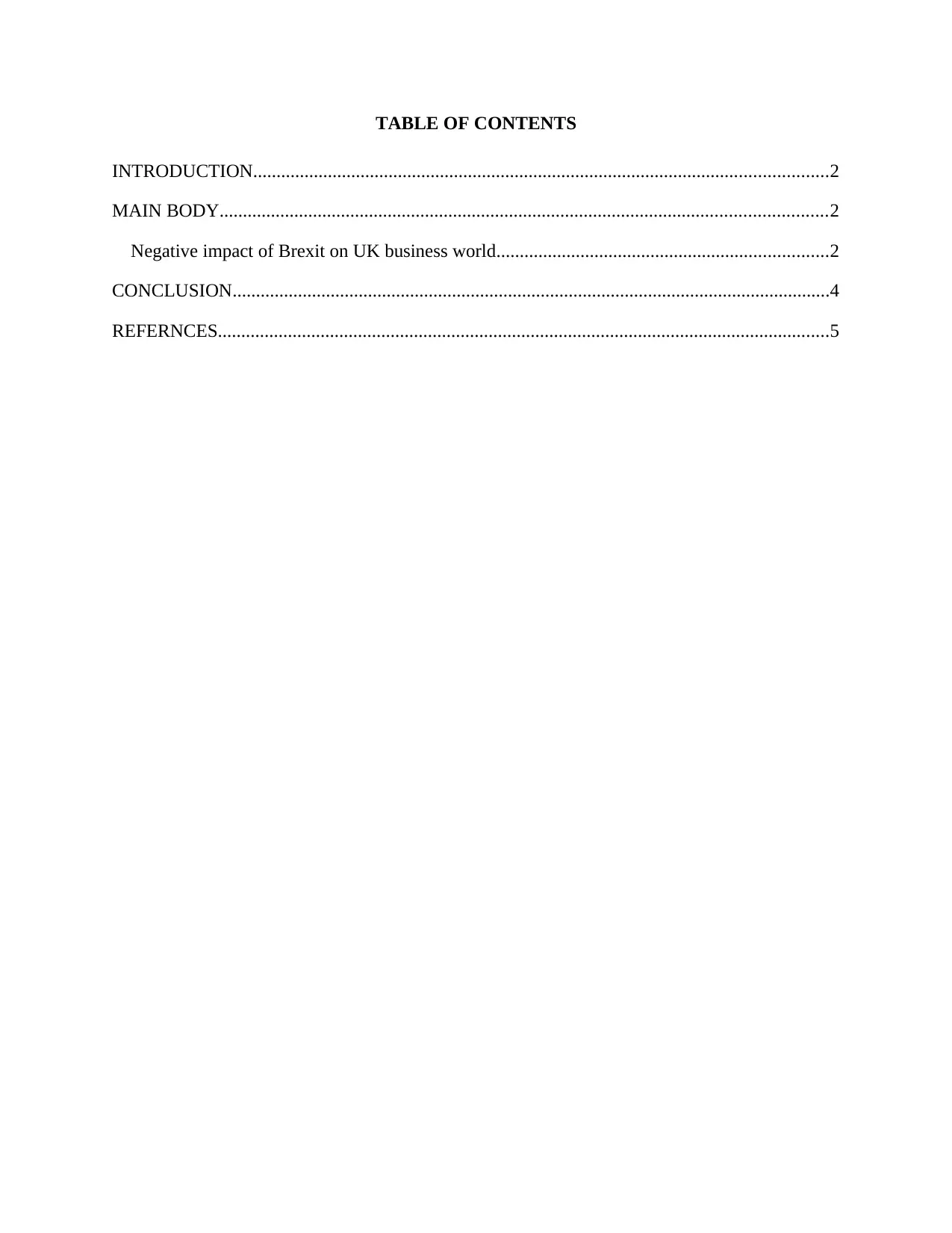
TABLE OF CONTENTS
INTRODUCTION...........................................................................................................................2
MAIN BODY..................................................................................................................................2
Negative impact of Brexit on UK business world.......................................................................2
CONCLUSION................................................................................................................................4
REFERNCES...................................................................................................................................5
INTRODUCTION...........................................................................................................................2
MAIN BODY..................................................................................................................................2
Negative impact of Brexit on UK business world.......................................................................2
CONCLUSION................................................................................................................................4
REFERNCES...................................................................................................................................5
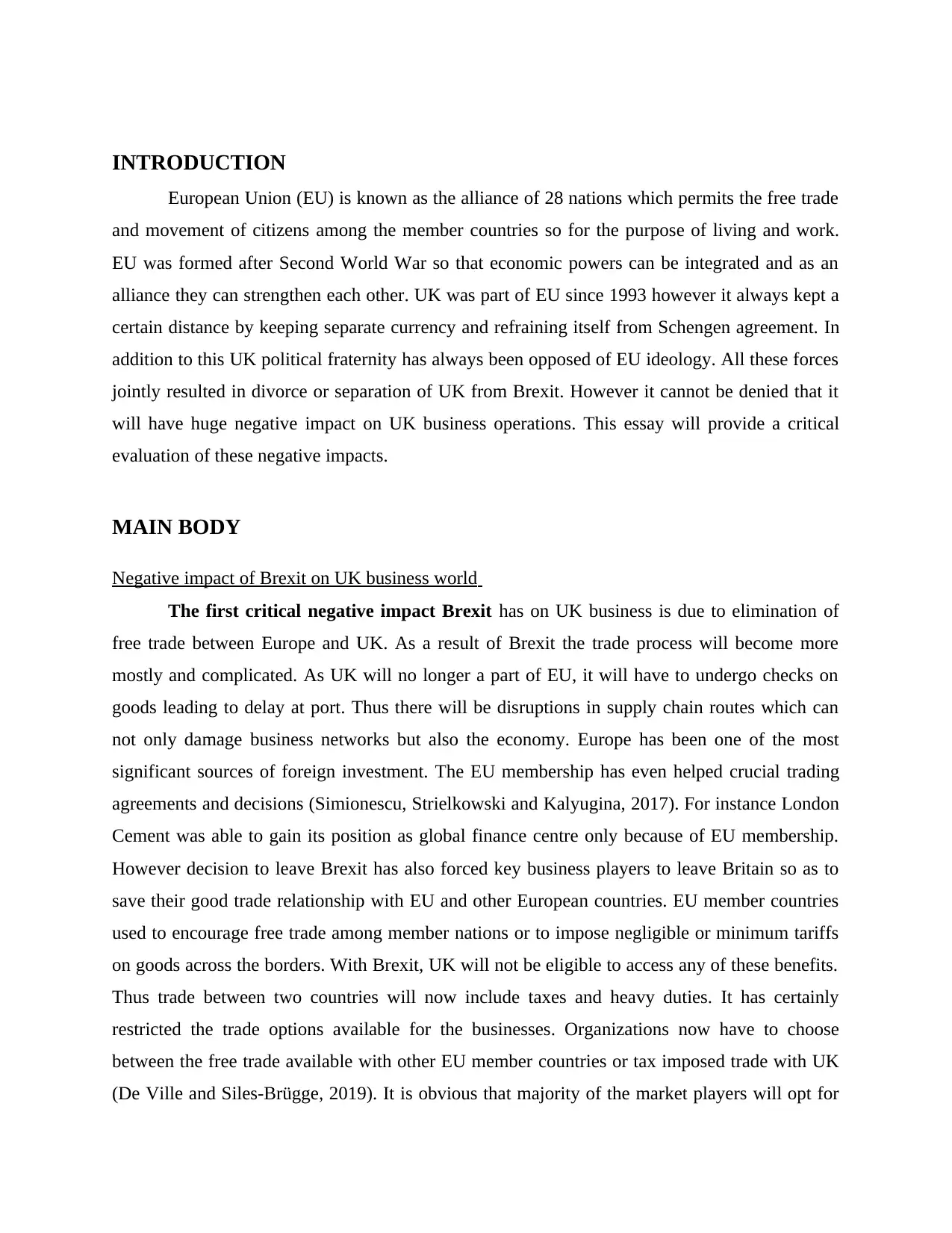
INTRODUCTION
European Union (EU) is known as the alliance of 28 nations which permits the free trade
and movement of citizens among the member countries so for the purpose of living and work.
EU was formed after Second World War so that economic powers can be integrated and as an
alliance they can strengthen each other. UK was part of EU since 1993 however it always kept a
certain distance by keeping separate currency and refraining itself from Schengen agreement. In
addition to this UK political fraternity has always been opposed of EU ideology. All these forces
jointly resulted in divorce or separation of UK from Brexit. However it cannot be denied that it
will have huge negative impact on UK business operations. This essay will provide a critical
evaluation of these negative impacts.
MAIN BODY
Negative impact of Brexit on UK business world
The first critical negative impact Brexit has on UK business is due to elimination of
free trade between Europe and UK. As a result of Brexit the trade process will become more
mostly and complicated. As UK will no longer a part of EU, it will have to undergo checks on
goods leading to delay at port. Thus there will be disruptions in supply chain routes which can
not only damage business networks but also the economy. Europe has been one of the most
significant sources of foreign investment. The EU membership has even helped crucial trading
agreements and decisions (Simionescu, Strielkowski and Kalyugina, 2017). For instance London
Cement was able to gain its position as global finance centre only because of EU membership.
However decision to leave Brexit has also forced key business players to leave Britain so as to
save their good trade relationship with EU and other European countries. EU member countries
used to encourage free trade among member nations or to impose negligible or minimum tariffs
on goods across the borders. With Brexit, UK will not be eligible to access any of these benefits.
Thus trade between two countries will now include taxes and heavy duties. It has certainly
restricted the trade options available for the businesses. Organizations now have to choose
between the free trade available with other EU member countries or tax imposed trade with UK
(De Ville and Siles-Brügge, 2019). It is obvious that majority of the market players will opt for
European Union (EU) is known as the alliance of 28 nations which permits the free trade
and movement of citizens among the member countries so for the purpose of living and work.
EU was formed after Second World War so that economic powers can be integrated and as an
alliance they can strengthen each other. UK was part of EU since 1993 however it always kept a
certain distance by keeping separate currency and refraining itself from Schengen agreement. In
addition to this UK political fraternity has always been opposed of EU ideology. All these forces
jointly resulted in divorce or separation of UK from Brexit. However it cannot be denied that it
will have huge negative impact on UK business operations. This essay will provide a critical
evaluation of these negative impacts.
MAIN BODY
Negative impact of Brexit on UK business world
The first critical negative impact Brexit has on UK business is due to elimination of
free trade between Europe and UK. As a result of Brexit the trade process will become more
mostly and complicated. As UK will no longer a part of EU, it will have to undergo checks on
goods leading to delay at port. Thus there will be disruptions in supply chain routes which can
not only damage business networks but also the economy. Europe has been one of the most
significant sources of foreign investment. The EU membership has even helped crucial trading
agreements and decisions (Simionescu, Strielkowski and Kalyugina, 2017). For instance London
Cement was able to gain its position as global finance centre only because of EU membership.
However decision to leave Brexit has also forced key business players to leave Britain so as to
save their good trade relationship with EU and other European countries. EU member countries
used to encourage free trade among member nations or to impose negligible or minimum tariffs
on goods across the borders. With Brexit, UK will not be eligible to access any of these benefits.
Thus trade between two countries will now include taxes and heavy duties. It has certainly
restricted the trade options available for the businesses. Organizations now have to choose
between the free trade available with other EU member countries or tax imposed trade with UK
(De Ville and Siles-Brügge, 2019). It is obvious that majority of the market players will opt for
⊘ This is a preview!⊘
Do you want full access?
Subscribe today to unlock all pages.

Trusted by 1+ million students worldwide
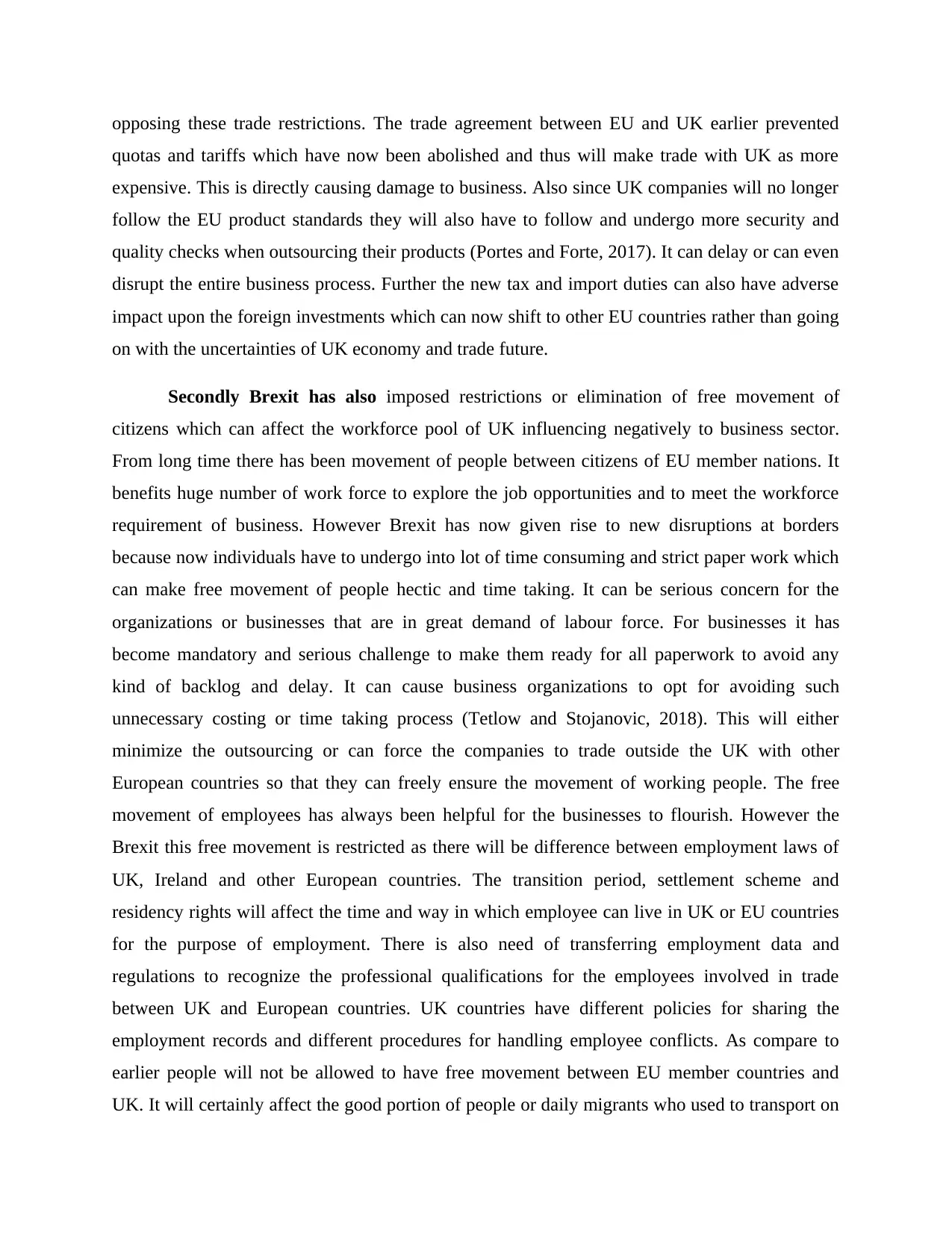
opposing these trade restrictions. The trade agreement between EU and UK earlier prevented
quotas and tariffs which have now been abolished and thus will make trade with UK as more
expensive. This is directly causing damage to business. Also since UK companies will no longer
follow the EU product standards they will also have to follow and undergo more security and
quality checks when outsourcing their products (Portes and Forte, 2017). It can delay or can even
disrupt the entire business process. Further the new tax and import duties can also have adverse
impact upon the foreign investments which can now shift to other EU countries rather than going
on with the uncertainties of UK economy and trade future.
Secondly Brexit has also imposed restrictions or elimination of free movement of
citizens which can affect the workforce pool of UK influencing negatively to business sector.
From long time there has been movement of people between citizens of EU member nations. It
benefits huge number of work force to explore the job opportunities and to meet the workforce
requirement of business. However Brexit has now given rise to new disruptions at borders
because now individuals have to undergo into lot of time consuming and strict paper work which
can make free movement of people hectic and time taking. It can be serious concern for the
organizations or businesses that are in great demand of labour force. For businesses it has
become mandatory and serious challenge to make them ready for all paperwork to avoid any
kind of backlog and delay. It can cause business organizations to opt for avoiding such
unnecessary costing or time taking process (Tetlow and Stojanovic, 2018). This will either
minimize the outsourcing or can force the companies to trade outside the UK with other
European countries so that they can freely ensure the movement of working people. The free
movement of employees has always been helpful for the businesses to flourish. However the
Brexit this free movement is restricted as there will be difference between employment laws of
UK, Ireland and other European countries. The transition period, settlement scheme and
residency rights will affect the time and way in which employee can live in UK or EU countries
for the purpose of employment. There is also need of transferring employment data and
regulations to recognize the professional qualifications for the employees involved in trade
between UK and European countries. UK countries have different policies for sharing the
employment records and different procedures for handling employee conflicts. As compare to
earlier people will not be allowed to have free movement between EU member countries and
UK. It will certainly affect the good portion of people or daily migrants who used to transport on
quotas and tariffs which have now been abolished and thus will make trade with UK as more
expensive. This is directly causing damage to business. Also since UK companies will no longer
follow the EU product standards they will also have to follow and undergo more security and
quality checks when outsourcing their products (Portes and Forte, 2017). It can delay or can even
disrupt the entire business process. Further the new tax and import duties can also have adverse
impact upon the foreign investments which can now shift to other EU countries rather than going
on with the uncertainties of UK economy and trade future.
Secondly Brexit has also imposed restrictions or elimination of free movement of
citizens which can affect the workforce pool of UK influencing negatively to business sector.
From long time there has been movement of people between citizens of EU member nations. It
benefits huge number of work force to explore the job opportunities and to meet the workforce
requirement of business. However Brexit has now given rise to new disruptions at borders
because now individuals have to undergo into lot of time consuming and strict paper work which
can make free movement of people hectic and time taking. It can be serious concern for the
organizations or businesses that are in great demand of labour force. For businesses it has
become mandatory and serious challenge to make them ready for all paperwork to avoid any
kind of backlog and delay. It can cause business organizations to opt for avoiding such
unnecessary costing or time taking process (Tetlow and Stojanovic, 2018). This will either
minimize the outsourcing or can force the companies to trade outside the UK with other
European countries so that they can freely ensure the movement of working people. The free
movement of employees has always been helpful for the businesses to flourish. However the
Brexit this free movement is restricted as there will be difference between employment laws of
UK, Ireland and other European countries. The transition period, settlement scheme and
residency rights will affect the time and way in which employee can live in UK or EU countries
for the purpose of employment. There is also need of transferring employment data and
regulations to recognize the professional qualifications for the employees involved in trade
between UK and European countries. UK countries have different policies for sharing the
employment records and different procedures for handling employee conflicts. As compare to
earlier people will not be allowed to have free movement between EU member countries and
UK. It will certainly affect the good portion of people or daily migrants who used to transport on
Paraphrase This Document
Need a fresh take? Get an instant paraphrase of this document with our AI Paraphraser
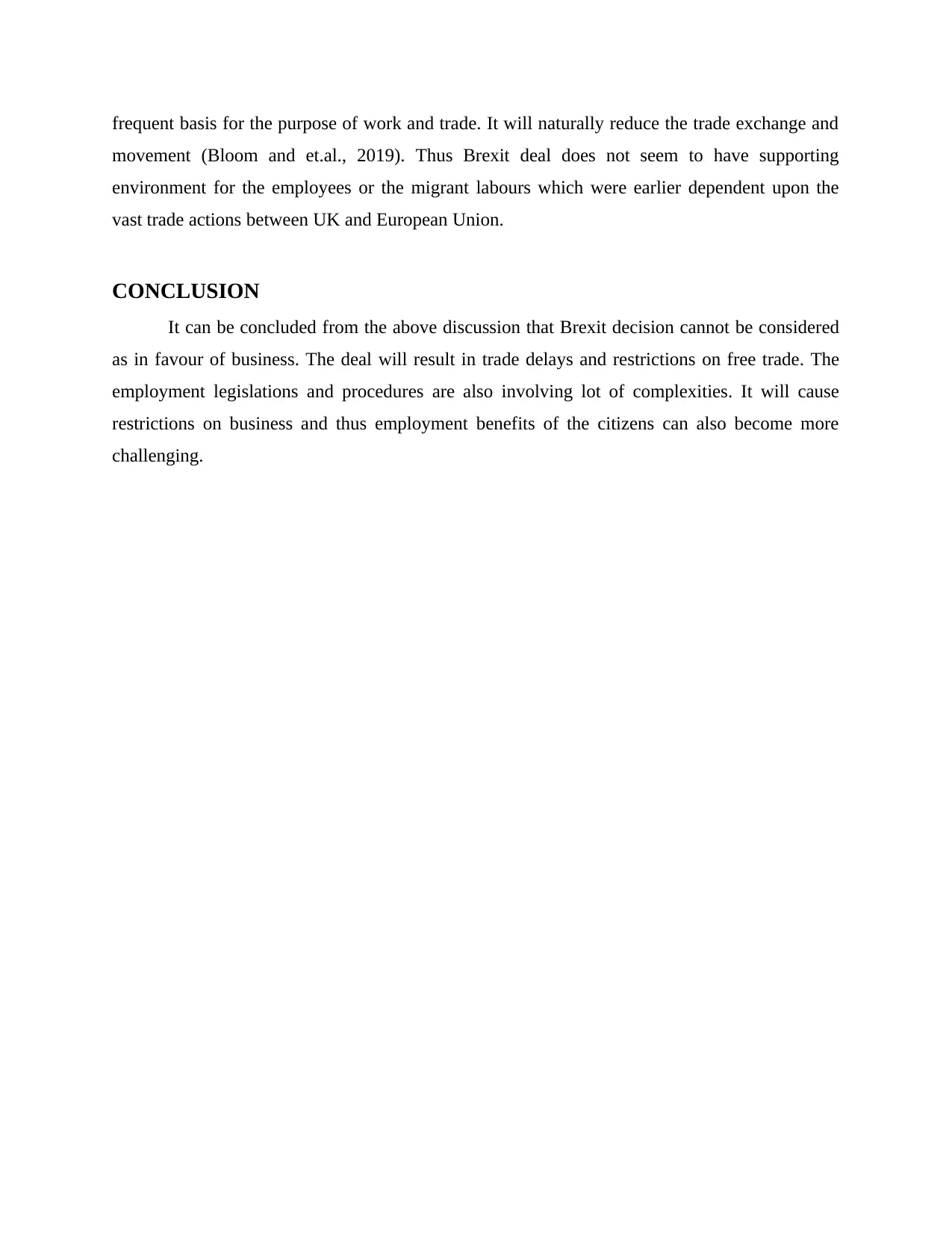
frequent basis for the purpose of work and trade. It will naturally reduce the trade exchange and
movement (Bloom and et.al., 2019). Thus Brexit deal does not seem to have supporting
environment for the employees or the migrant labours which were earlier dependent upon the
vast trade actions between UK and European Union.
CONCLUSION
It can be concluded from the above discussion that Brexit decision cannot be considered
as in favour of business. The deal will result in trade delays and restrictions on free trade. The
employment legislations and procedures are also involving lot of complexities. It will cause
restrictions on business and thus employment benefits of the citizens can also become more
challenging.
movement (Bloom and et.al., 2019). Thus Brexit deal does not seem to have supporting
environment for the employees or the migrant labours which were earlier dependent upon the
vast trade actions between UK and European Union.
CONCLUSION
It can be concluded from the above discussion that Brexit decision cannot be considered
as in favour of business. The deal will result in trade delays and restrictions on free trade. The
employment legislations and procedures are also involving lot of complexities. It will cause
restrictions on business and thus employment benefits of the citizens can also become more
challenging.
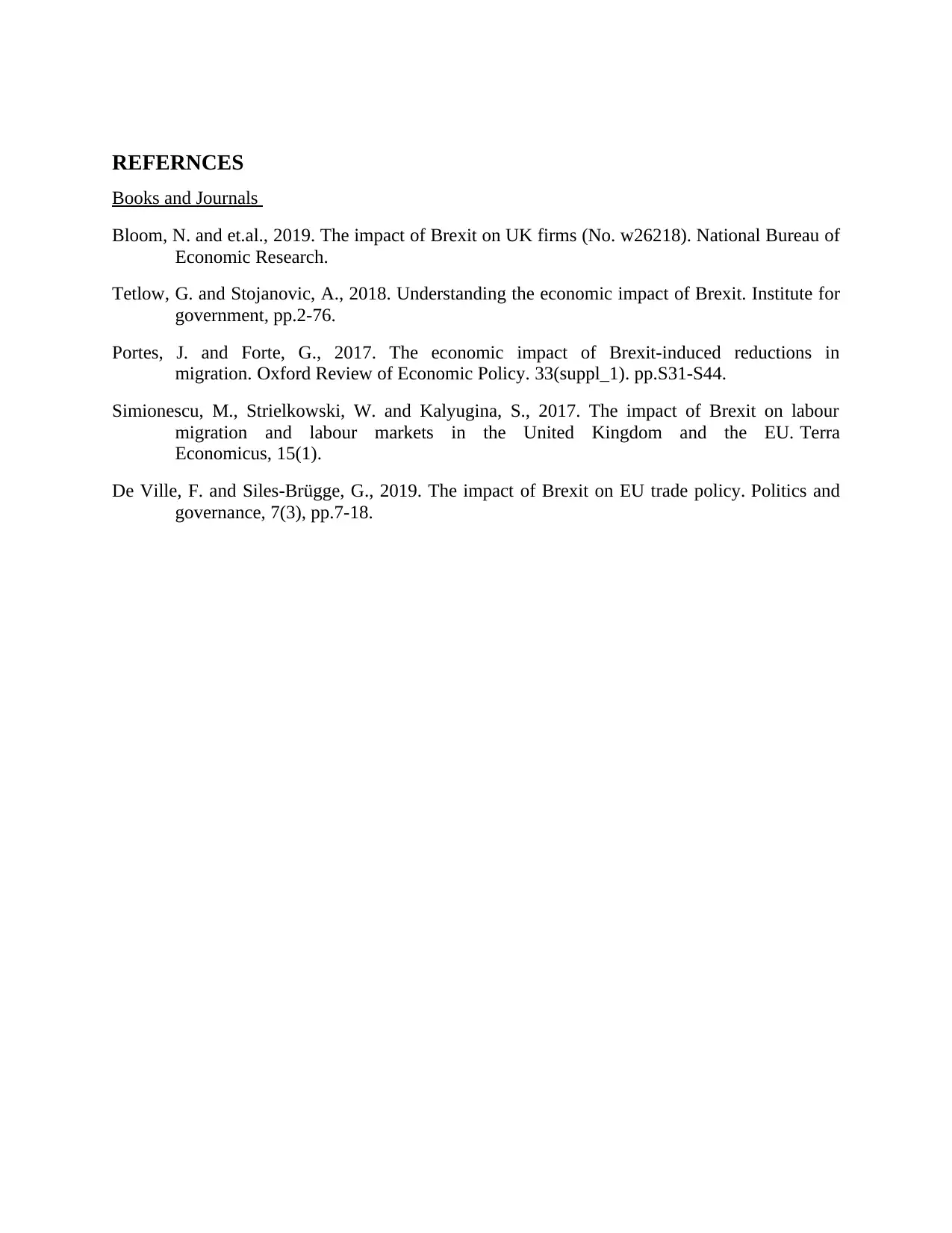
REFERNCES
Books and Journals
Bloom, N. and et.al., 2019. The impact of Brexit on UK firms (No. w26218). National Bureau of
Economic Research.
Tetlow, G. and Stojanovic, A., 2018. Understanding the economic impact of Brexit. Institute for
government, pp.2-76.
Portes, J. and Forte, G., 2017. The economic impact of Brexit-induced reductions in
migration. Oxford Review of Economic Policy. 33(suppl_1). pp.S31-S44.
Simionescu, M., Strielkowski, W. and Kalyugina, S., 2017. The impact of Brexit on labour
migration and labour markets in the United Kingdom and the EU. Terra
Economicus, 15(1).
De Ville, F. and Siles-Brügge, G., 2019. The impact of Brexit on EU trade policy. Politics and
governance, 7(3), pp.7-18.
Books and Journals
Bloom, N. and et.al., 2019. The impact of Brexit on UK firms (No. w26218). National Bureau of
Economic Research.
Tetlow, G. and Stojanovic, A., 2018. Understanding the economic impact of Brexit. Institute for
government, pp.2-76.
Portes, J. and Forte, G., 2017. The economic impact of Brexit-induced reductions in
migration. Oxford Review of Economic Policy. 33(suppl_1). pp.S31-S44.
Simionescu, M., Strielkowski, W. and Kalyugina, S., 2017. The impact of Brexit on labour
migration and labour markets in the United Kingdom and the EU. Terra
Economicus, 15(1).
De Ville, F. and Siles-Brügge, G., 2019. The impact of Brexit on EU trade policy. Politics and
governance, 7(3), pp.7-18.
⊘ This is a preview!⊘
Do you want full access?
Subscribe today to unlock all pages.

Trusted by 1+ million students worldwide
1 out of 6
Related Documents
Your All-in-One AI-Powered Toolkit for Academic Success.
+13062052269
info@desklib.com
Available 24*7 on WhatsApp / Email
![[object Object]](/_next/static/media/star-bottom.7253800d.svg)
Unlock your academic potential
Copyright © 2020–2026 A2Z Services. All Rights Reserved. Developed and managed by ZUCOL.




